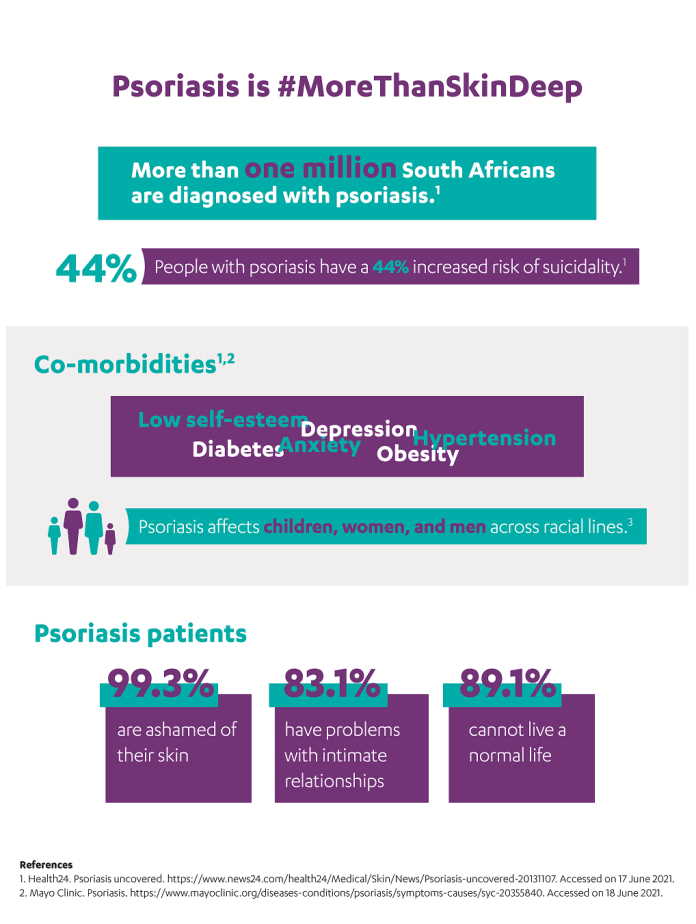“Small things like having beautiful linen was impossible as I had to wash my linen daily because of the ointments.” These are the powerful words of Cheslin*, one of more than a million South Africans living with psoriasis.1
Cheslin was diagnosed with psoriasis 10 years ago. Before his diagnosis, he experienced psoriasis flare-ups on his face and scalp. His hands were covered with red patches, and his fingernails started to lift as his condition worsened. Cheslin and his colleagues frequently recoiled at the large flakes on his office chair and his desk.
What is psoriasis?
Psoriasis is a chronic and debilitating auto-immune condition where the body is at war with itself. It results in a build-up of skin cells which forms thick patches, called plaques, on the skin surface.1 These plaques are red, flaky, itchy, and painful.1 Even though psoriasis is visible on the skin, it goes deeper than that, causing extensive swelling and inflammation to other organs and body tissues.2,3
“Psoriasis is not just a skin condition,” said Dr Lushen Pillay, a specialist dermatologist in Johannesburg. “There is up to 75% increase in conditions like hypertension (high blood pressure), diabetes and obesity in psoriasis patients, compared to patients who don’t have psoriasis.”
Over and above this, psoriatic arthritis affects an estimated 15% of people with psoriasis.1 This condition causes swollen and painful joints that can be disabling.2 “When you get psoriatic arthritis, a severe form of psoriasis, it becomes irreversible,” added Dr Pillay. “Which is why getting a diagnosis as soon as possible is critical.”
What’s the difference between psoriasis and eczema?
Psoriasis and eczema both cause patches of red, raised, and itchy skin on the hands and scalp.4
In eczema, genetic and environmental factors trigger an itchy red rash, which often occurs on the back of the knees or inside the elbows.4
Psoriasis is most evident as red, flaky patches, covered in white, silvery scales on the elbows, knees, buttocks, and face.4 People living with psoriasis often experience a milder itch, but a terrible burn.4
“Although eczema and psoriasis are both inflammatory conditions, they present differently. In psoriasis, people only notice changes to the skin, but the condition is affecting the rest of the body. People with psoriasis may also have symptoms in their joints. In addition, psoriasis and eczema inflammatory markers are different, so too are the medications. Psoriasis medication needs to treat the entire body,” said Dr Ugeshnie Naidoo, a specialist dermatologist in Pretoria.
Is clear skin possible?
Psoriasis is a lifelong condition for which there is no cure. However, with the right treatment, people can manage their condition and improve their quality of life.
“There’s a new treatment for psoriasis called biologics. They are easy to administer, safe and extremely effective. As a result, patients can achieve clear skin and carry on with their lives as normal,” said Dr Pillay.
Cheslin, who has recently started a biologic treatment plan and has clear skin, agrees. “I have clear skin now. For the first time I am happy, confident, pain-free, and comfortable in my own skin,” he said.
When should psoriasis be treated?
“Early diagnosis and treatment for psoriasis is extremely critical. When you treat psoriasis early, you control the condition for much longer in the future. You also prevent mental health and self-esteem issues, hypertension and diabetes,” concluded Dr Pillay.
THE HYPERLINK FOR SPEAK TO YOUR DERMATOLOGIST LINKS TO DERMA.CO.ZA.
If you or a loved one is living with psoriasis, speak to your dermatologist about effective treatment. Some dermatologists offer virtual consultations, which is helpful if you’re unable to seek help in person. You can also access valuable resources like the #MoreThanSkinDeep Facebook community, a safe space to find credible information on psoriasis, lifestyle advice and to hear from others affected by the disease.
*The patient’s name has been changed to protect their privacy.












